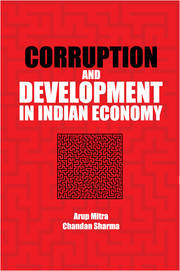Book contents
- Frontmatter
- Contents
- List of Tables and Figures
- Preface
- 1 Issues in Corruption: Theoretical and Empirical
- 2 Corruption in India: A Comparison with the Rest of the World
- 3 Estimation of Personal Income Tax Evasion in India: Evidence from Household Survey
- 4 Effects of Corruption on Firms' Performance: Evidence from Firm Level Data
- 5 Determinants of Bribery in Indian Firms: Who Must Pay Bribes?
- 6 Labour Market Flexibility and Corruption: Issues Related to Labour Contractualization and Business Subcontracting
- 7 Corruption in Innovation: Effect of Innovation on Performance
- References
- Index
Preface
Published online by Cambridge University Press: 23 July 2017
- Frontmatter
- Contents
- List of Tables and Figures
- Preface
- 1 Issues in Corruption: Theoretical and Empirical
- 2 Corruption in India: A Comparison with the Rest of the World
- 3 Estimation of Personal Income Tax Evasion in India: Evidence from Household Survey
- 4 Effects of Corruption on Firms' Performance: Evidence from Firm Level Data
- 5 Determinants of Bribery in Indian Firms: Who Must Pay Bribes?
- 6 Labour Market Flexibility and Corruption: Issues Related to Labour Contractualization and Business Subcontracting
- 7 Corruption in Innovation: Effect of Innovation on Performance
- References
- Index
Summary
Why people cheat is an age-old question that has motivated scholars to find an appropriate answer. The simplest answer perhaps lies in the fact that some, if not many, have a tendency to gain more returns than what is proportionate to their efforts or endowments. And to materialize this they often stoop down to take recourse to corrupt means. Religion uses fear to caution individuals while spiritualism urges not to indulge in it by reminding the transitory satisfaction that material wealth can offer and the negativity that the mind develops by cultivating the desire to receive disproportionate gains. All this do not work for those who do not believe in preaching. Hence, there is the need for someone's existence to punish the greedy, be it law or any other entity.
While some individuals may believe in corruption some may not, and more importantly the degree of pursuing corruption may vary widely across individuals and instances. The same individual may remain absolutely honest in a particular situation but in another he may be hard-pressed to compromise. The moralists would of course suggest that one must stay firm whatsoever dire consequences may come in one's way, though a common individual may find it difficult to practice always. So, enforcement of utmost transparency and strict policy of retribution for one who claims bribe may be recommended. But there can still be slips because as the number of players increases, the probability of avoiding law and pursuing corruption rises.
Some of these thoughts pressed us to pursue a rigourous analysis of corruption issues, particularly in the backdrop of the Indian economy. Given the rise and fall of certain political parties in the recent years in the name of corruption a study of such kind is indeed warranted. Having highlighted in chapter 1 how corruption is viewed in the theoretical and empirical literature and how various macro and micro level approaches have been followed to study corruption we delegate the rest of the volume to purely empirical issues. Chapter 2 carries out an inter-country comparison of corruption.
- Type
- Chapter
- Information
- Corruption and Development in Indian Economy , pp. xi - xiiPublisher: Cambridge University PressPrint publication year: 2016



